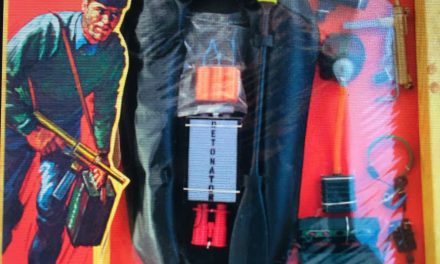I just finished my third refret – an Epiphone Les Paul with the poly finish stripped off the back of the neck. This guitar is a learning tool – years ago it was my main guitar, but it got dinged up, I was never happy with the sound regardless of the pickups I tried in it, and so I started conducting unauthorized experiments on it. I took all the finish off the neck and then made it thinner with a big ass file and some sanding paper and a little sander that I love called the Mouse by Black & Decker.
Anyway, after years of being played, it had fret dents left and right. These were medium-jumbo frets, and I didn’t want to try to level the frets because I hate short frets. So I’d done two unbound necks and it was time to do a bound neck.
Unlike my first attempt, I did not cut any corners. I did everything the way I thought I should. As a result, the guitar plays well on all of the strings except the high E – it’s got a real plinky type of sound on that string. I can guess why. I tried to fret this guitar like it had been fretted, with the frets ending in the middle of the binding, and obviously I screwed up on some of the fret ends. Not that I’m totally surprised. If I could be an expert at fretting guitars after only 3 attempts, I’d be some type of gifted luthier, which I am definitely not.
Here is what I have learned – there are still some tools I need that I don’t have, and once I get those tools, my fretwork will take another big step forward. Learning how to do fretwork can only be accomplished one way – by doing fretwork. You have to put the time in. You’ve got to be willing to do it a lot. One luthier (can’t remember his name) said in an online article/web page that it takes about 50 refrets before you know what you’re doing. I don’t think I’ll need to do 47 more before I’m good at it, but I do agree that you have to do a bunch of them.
Which means you really have to enjoy it. You have to like the process, working with your hands, and you have to be willing to do refrets knowing that they won’t be very good when you start out. So you have to work on guitars you don’t care about. You also have to be willing to watch the tutorial videos, read the articles and directions, and pay the bucks for the proper tools. My next investment is going to be Dan Erlewine’s book on fretting. I already have the basic and advanced fretting DVD’s.
Do I enjoy it? Yeah, I definitely do. Sometimes it bugs me a little that I spread myself too thin. If I ever wanted to be really great at something I would need to focus on that and not do a million other things. I think that is good advice… for your job/career. For your hobbies, I don’t know that putting a lot of pressure on yourself is a great idea. On the other hand, if you don’t put some pressure on yourself, you’ll never finish anything. I don’t stop in the middle of a refret – I finish it.
Is fretting for you? It will cost you some money and time to find out, but you can buy some used POS guitar at Guitar Center for a hundred bucks, get and watch the videos, buy the tools, and give it a shot. Once you’ve done your first refret you will know. If you say “Man, I wouldn’t want to do that again,” then maybe you need to pick a different hobby. But if the first thought you have is “Next time I’m gonna do it differently,” then you might be on the road to a new hobby. One thing is for sure, though – you WILL need to refret a bunch of times before you’re good at it. And this hobby requires tools you can’t find at Home Depot. It’s not worth learning all of this if you only have one or two guitars and you don’t have any interest in doing guitar luthier work.




